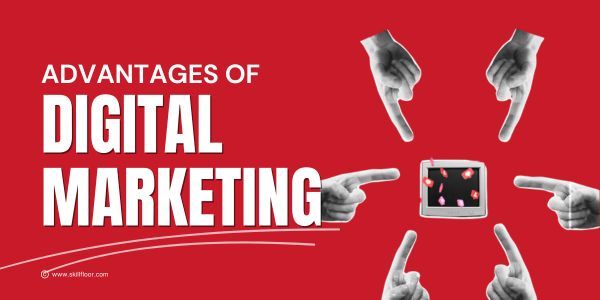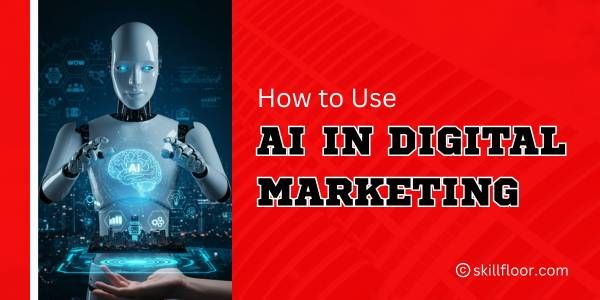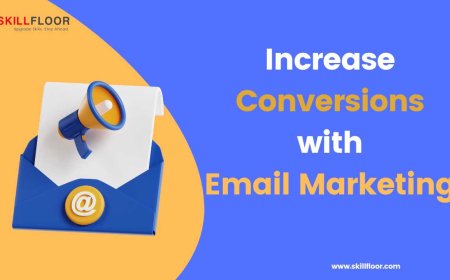What are the Advantages of Digital Marketing
The top advantages of digital marketing for businesses, from global reach to cost-effectiveness, targeted advertising, and real-time analytics for better ROI.

From experience, the exciting field of digital marketing is always changing, which makes it an exciting and significant career choice. Digital marketing offers quantifiable and planned methods to reach customers throughout the globe in addition to allowing creative expression. In fact, according to a surprising statistic, more than 44% of businesses prioritize a digital-first strategy in their marketing strategies, and the field of digital marketing is expected to increase by 52% in employment, making it one of the fastest-growing industries in the world. This blog explores the many advantages of digital marketing, highlighting its importance for modern businesses and how it is changing traditional advertising methods.
What is Digital Marketing?
Using online platforms including websites, social media, email, and search engines to advertise goods and services is known as digital marketing. Digital marketing uses internet-based platforms to reach and interact with a worldwide audience, compared to traditional marketing strategies that concentrate on physical media. It's a generic name for a variety of strategies, each designed to accomplish particular marketing goals, including SEO, PPC, content marketing, and more.
Importance of Digital Marketing
For companies of all kinds, having an online presence is essential in today's technologically advanced world. In ways that traditional marketing techniques cannot match, digital marketing helps businesses connect with their future customers, increase engagement, and produce leads. Beyond reach, digital marketing is essential because it gives companies the capacity to monitor their progress, make real-time campaign adjustments, and eventually increase return on investment (ROI). Through direct customer communication on social media or customized email marketing, brands may create lasting relationships and an engaged audience.
Key Advantages of Digital Marketing
1. Global Reach
Geographical boundaries are removed by digital marketing, which enables companies to reach consumers anywhere in the world. Digital marketing allows you to advertise your goods worldwide, greatly increasing your market reach, no matter how big or small your company is. Even small companies can compete on a global level without spending a lot of money on marketing due to digital ads, SEO, and social media.
2. Cost-Effectiveness
Cost-effectiveness is one of the most significant advantages of digital marketing. Especially for small companies, traditional marketing techniques like print and television advertisements can be costly. Businesses can target particular groups and manage their advertising budgets with digital marketing's more affordable method. Brands can allocate spending more effectively through channels like content marketing, PPC advertising, and social media ads, which ensures a higher return on investment.
3. Targeted Advertising
Highly targeted advertising is made possible by digital marketing, which enables companies to connect with clients according to their demographics, interests, and behaviours. Businesses can develop customized campaigns that connect with their audience and boost engagement and conversion rates by using data from social media and platforms like Google. For example, brands can target individuals with certain interests or characteristics using social media advertising, increasing the accuracy and efficacy of marketing campaigns.
4. Measurable Results
Digital marketing offers real-time data and analytics, in contrast to traditional marketing, which can make it difficult to measure the success of campaigns. To make well-informed decisions, businesses can monitor performance measures like website traffic, conversion rates, and click-through rates (CTR). By providing insights into how customers behave, tools such as Google Analytics help companies improve their strategies based on data that can be verified.
5. Improved Conversion Rates
Businesses can interact with customers at every point in the purchasing process through digital marketing. Businesses may nurture leads and direct them toward conversion using specific messages and targeted advertisements. Retargeting advertisements and email marketing are two channels that are especially good at converting new customers, which increases revenue and sales.
6. Enhanced Customer Engagement
Brands can interact directly with their audience through a variety of platforms provided by digital marketing. Because social media platforms like Facebook, Instagram, and Twitter facilitate two-way contact, businesses can quickly collect feedback and reply to consumer inquiries. Brands can increase customer loyalty and trust by interacting with consumers in real-time, converting one-time purchasers into devoted customers.
7. Easy Adjustments and Flexibility
Digital marketing gives companies the ability to modify their campaigns as necessary. Changes can be made quickly if an advertisement or piece of content isn't working as planned, ensuring that marketing efforts stay effective and relevant. This flexibility increases the chance of reaching advertising goals and enables more effective use of resources.
8. Making Decisions Based on Data
A multitude of data is accessible through digital marketing, and this data can be used to understand the preferences and behaviours of customers. Metric analysis enables brands to learn what works and what doesn't, enabling ongoing development. Businesses can improve their marketing efforts and make well-informed decisions using methods based on information.
9. Improved Segmentation of Audiences
Precise audience segmentation according to demographics, interests, and behaviours is made possible by digital marketing solutions. By using segmentation, organizations can better target their messaging and provide appropriate content to various customer segments, increasing the effectiveness and personalization of their marketing campaigns.
10. Accessibility to a Mobile Audience
With more people using mobile devices, digital marketing offers a great method to connect with customers while they're on the road. Brands can reach customers anywhere with mobile-friendly content, applications, and SMS marketing, resulting in a smooth and practical user experience.
11. A Variety of Content Types
To meet a wide range of audience preferences, digital marketing supports a variety of content formats, such as podcasts, blogs, infographics, and videos. Because of its adaptability, marketers can try out various formats to reach a wider audience and maintain interesting and required content.
12. Increased Brand Credibility
Using digital marketing to create an online presence enhances the authority and credibility of a brand. Brands may position themselves as trustworthy leaders in their sector by providing great customer service, sharing useful data, and interacting with followers. Long-term company performance depends on increased consumer trust and loyalty, which is a result of this credibility.
Role of Digital Marketing in Business Success
1. Increasing Reach and Visibility
Brands may reach a worldwide audience with digital marketing without having to pay the high prices of traditional marketing. Businesses can interact with potential clients globally through channels like social media, SEO, and email, expanding their visibility across a range of demographics and geographical areas.
2. Specifically Targeting Particular Audiences
Digital marketing allows businesses to reach niche audiences based on their demographics, interests, and behaviours through tools like social media targeting and PPC advertising. By providing relevant content that attracts particular audience segments, this focused strategy raises engagement and conversion rates.
3. Measuring Campaign Effectiveness
As digital marketing is data-driven, it gives marketers access to real-time analytics for monitoring KPIs like click-through rates, website traffic, and conversions. Businesses may make well-informed modifications to improve return on investment (ROI) and continuously refine campaigns due to this ability to monitor performance.
4. Building Brand Credibility and Authority
Digital marketing helps companies establish credibility by posting insightful information, participating in social media conversations, and answering customer comments. Long-term customer connections are facilitated by brands being positioned as industry leaders and building trust through consistently improving customers' lives through online content.
5. Improving Customer Retention and Engagement
Continuous interactions with customers made possible by digital marketing help to maintain brand awareness and promote repeat business. Techniques like customized email marketing and focused retargeting advertisements keep customers interested, which facilitates the development of loyal customers and promotes company expansion.
How to Use Different Types of Digital Marketing Channels
Effective use of several channels is essential in digital marketing to grow audience reach and increase engagement. This is an easy overview of how to use various digital marketing channels:

Search Engine Optimization (SEO)
The goal of SEO is to improve a website's content so that it appears higher in search engine rankings. Brands may draw in organic traffic from consumers who are actively looking for similar goods or services by optimizing keywords, enhancing site architecture, and producing high-quality content. Consistent SEO work helps in improving exposure on search engines like Google and Bing.
PPC, or pay-per-click, advertising
Brands can publish adverts on search engines or other websites using PPC advertising, like Google adverts, and only pay when people click. It is a fast method of increasing website traffic and is particularly helpful for focusing on particular keywords or demographics. Real-time PPC ad adjustments are possible, providing flexibility according to performance indicators.
Social Media Marketing
Brands can interact directly with their audience using social media sites like Facebook, Instagram, LinkedIn, and Twitter. Brands increase recognition and loyalty through content sharing, advertising, and follower interaction. Social media marketing is perfect for building a community and communicating with customers.
Content Marketing
To engage and educate the audience, content marketers provide informative and entertaining content such as eBooks, videos, infographics, and blog entries. By drawing in, educating, and supporting new customers, this material gradually increases authority and trust. It's an effective technique for increasing traffic and creating lasting relationships.
Email Marketing
Businesses can interact directly with subscribers using email marketing, whether to provide corporate news, offer discounts or promote new products. Targeted marketing and personalized emails work well for building customer loyalty, increasing sales, and nurturing prospects. Additionally, automated emails can save time and ensure regular correspondence.
Affiliate Marketing
Businesses collaborate with affiliates who sell their goods or services in return for a commission in affiliate marketing. Through reliable third-party promoters, this strategy increases reach and boosts sales, which is advantageous for gaining new customers.
Brands can reach a larger audience by utilizing influencers, or individuals with sizable internet followings. Because followers frequently believe the advice of influencers, influencer marketing increases credibility. Working together with social media influencers can boost product engagement and brand recognition.
Mobile Marketing
Mobile marketing, which includes location-based marketing, SMS marketing, and mobile app ads, is essential for targeting consumers who are constantly on the go due to the growing use of smartphones. No matter where they are, mobile strategies ensure that companies can communicate with customers right away.
By adjusting strategies to audience preferences and behaviours, each of these digital marketing platforms helps companies better attract, engage, and retain customers. Companies can develop a thorough and effective digital marketing strategy through the combination of several media.
Digital Marketing Careers: Key Roles
Skills like creativity, data analysis, and strategic thinking are essential for several job pathways in digital marketing. A sample of typical roles is as follows:
-
Digital Marketing Manager: A digital marketing manager is in charge of a company's whole digital strategy, which includes email, advertisements, social media, and SEO. Project management and analytical skills are necessary for this position to ensure that marketing goals are fulfilled.
-
SEO Specialist: Through the use of selected keywords and site structure modifications, SEO specialists optimize websites to rank higher on search engines and generate organic traffic.
-
Content Marketing Specialist: A content marketing specialist develops captivating blog entries, videos, and other materials in line with brand objectives to draw in and hold onto consumers.
-
Social media manager: Controls brand presence on Facebook and Instagram, interacts with fans, and monitors results.
-
PPC Specialist: Manages paid advertising campaigns on social media or Google, maximizing return on investment.
-
Email marketing Specialist: Creates focused email campaigns to keep subscribers interested and promote trust among customers.
-
Analytics Specialist: An analytics specialist gathers and analyzes data to help improve marketing strategies and results.
These professions have opportunities for growth in a variety of industries due to the growing focus on digital-first strategies. Because it combines technical and artistic abilities, digital marketing is a perfect career choice for anyone wanting to have an influence online.
Advantages of a Career in Digital Marketing
-
High Demand: As organizations place more emphasis on online growth, digital marketing abilities are in great demand, opening up a wide range of work opportunities across industries.
-
Variety and Creativity: Digital marketing keeps work exciting and varied by fusing data analysis with creative content development.
-
Flexible Work Options: Achieving a work-life balance is made simpler by the fact that many positions provide freelance and remote work options.
-
Measurable Impact: Professionals can observe the immediate results of their labour and adjust their tactics accordingly thanks to digital marketing's real-time data.
-
Continuous Learning: There are many opportunities to pick up new skills and keep current in the area because the digital landscape is always changing.
Because of these elements, digital marketing is a flexible, expanding industry with fulfilling job opportunities.
The advantages of digital marketing are clear; from cost-effectiveness to real-time analytics and customized advertising, it provides a variety of advantages that make it essential for modern businesses. Businesses can stay competitive and succeed in the long run by implementing a flexible and data-driven strategy as the digital environment evolves. Adopting these benefits will help you engage your audience, build relationships, and grab new chances in the digital age, regardless of your level of experience with digital marketing or your desire to improve your current strategies.
In today's digital-first world, digital marketing is more than a trend; it's an essential tool for every brand wanting to succeed.





























































